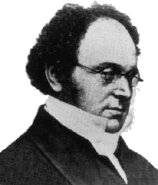June 27: Augustus de Morgan
Augustus de Morgan (1806)
It was on this date, June 27, 1806, that English mathematician and logician Augustus De Morgan was born in Madura, India. After losing the sight in his right eye while very young, the family returned to England. His disability resulted in a lack of sociability at school, but he excelled in studies and took a BA at Trinity College, Cambridge. However, De Morgan strongly objected to the theological test required for the MA, so his formal education ended there. For the same reason, he also rejected his parents' wish that he become a priest.
De Morgan was only 21 when he applied for the chair of mathematics at newly founded University College, London. He was appointed, in spite of having no publications on mathematics. In 1838 de Morgan introduced the concept of mathematical induction in an article for the Penny Cyclopedia. Over the years he would write 712 articles for the Cyclopedia.
As a man, he was, as Thomas Hirst described him, "A dry dogmatic pedant ... notwithstanding his unquestioned ability," and with a crusty personality baked in the isolation of infirmity. On principle, de Morgan refused Fellowship in the Royal Society and an honorary degree from the University of Edinburgh. But he was not without his sense of humor. De Morgan featured an anonymous poem called "The Astronomer's Drinking Song" in his 1886 book, Budget of Paradoxes, which was originally sung at a meeting of the Mathematical Society of London:
Whoe'er would search the starry sky,
Its secrets to divine, sir,
Should take his glass — I mean, should try
A glass or two of wine, sir! [...]Poor Galileo, forced to rat
Before the Inquisition,
He gave them in addition:
He meant, whate'er you think you prove,
The Earth must go its way, sirs;
Spite of your teeth I'll make it move,
For I'll drink my bottle a day, sirs!
Augustus de Morgan died in London at age 64 on 18 March 1871. Although toward the end of his life de Morgan tried to study clairvoyance and Spiritualism—he bears the dubious distinction of being the first notable scientist in Britain to take an interest in the study of spiritualism—it was because he was suspected of atheism that he was refused any teaching position at Oxford or Cambridge. Augustus de Morgan was in fact a Theist with an ethical appreciation of Christianity. He described himself as an “unattached Christian” and refused to join even the Unitarian Church. To this day, a crater on the moon bears his name.
Originally published June 2003 by Ronald Bruce Meyer.


